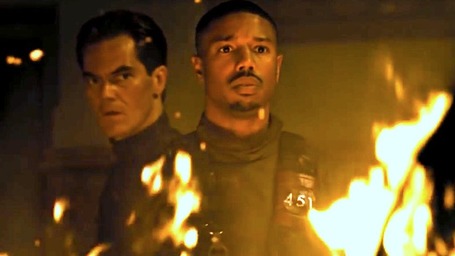D | A fireman entrusted with burning the nation's books has a crisis of conscience. Directed by Ramin Bahrani Starring Michael B. Jordan and Michael Shanon Initial Review by Jon Kissel |

Jordan is better-cast as Montag, but Bahrani also hampers him with too much distance on his arc. He goes from the most enthusiastic of firemen to the man who sacrifices himself to brings art back into the world. Why couldn’t he already have been disillusioned when the film started, shortening the distance he has to go? Instead, the film struggles both in communicating how or why he’s particularly good at his job, or in how the cracks start to form in his psyche. He is boldly and forcefully asserting the destructive force of the Eels, verbally dehumanizing them and gleefully casting them out of society, and then he’s suddenly moved by one’s death and taking the unchallenged word of not only an Eel, but an Eel who squeals on other Eels. He has apparently been keeping artifacts in his air ducts, but that person is so much more believable as someone further down the ladder instead of a city-wide hero. Maybe his position was elevated to get him closer to Beatty, but as previously stated, their rapport is ineffective. One of my favorite tropes in cinema is ‘person wakes up to the lies they’ve been told,’ and Montag should have several of those kinds of epiphanies. They’re included as mere events that need to happen by Bahrani instead of transcendent moments for Montag.
Bahrani, Naderi, and DP Kramer Morgenthau are being actively annoying in other spots. If there’s one thing I don’t like, it’s fish-eye lenses, and Fahrenheit 451 has a whole bunch of them. All that’s needed is the early one, representing the view of the Alexa-equivalents that are everywhere, but they keep showing up, including when the fire truck is racing to a raid. Despite the constant surveillance, there isn’t that feeling of inevitability that should accompany it. Instead, characters get away with things they shouldn’t, and then get found out thanks to old fashioned stake-outs. The whiff that is the surveillance theme goes along with the strike that is the portent and self-seriousness in so many shots. Look at the roiling waves on Montag’s wall while he thinks about his role in the world. Gross. The camera tricks and blatant imagery are strangling the film, and this is compounded by the ham-fisted use of current buzzwords or phrases that rip the viewer out of the experience. Avatar insisted on having a character say the soldiers were ‘going to fight terror with terror’ and that was a film with a full-on bad script. Fahrenheit 451 does the same when it says anything close to fake news or job-takers. Unique times call for unique satire, and this film ain’t it.
The aforementioned Wikipedia summary reads extremely ahead of its time for a book published in 1953. There’s plenty to work with for a contemporary adaptation, from the narcotization of the citizenry with inane media to the gleeful surrendering of privacy to technological firms and the encroaching idiocracy coupled with my favorite word of the Trump era, kakistocracy (government of the worst). Fahrenheit 451 doesn’t stretch towards any of these outcomes, squandering its strong premise in favor of half-baked character dynamics and on-the-nose references. D+
 RSS Feed
RSS Feed